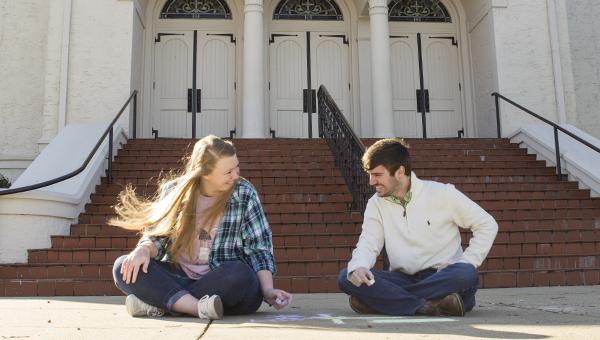Eric Mayo spent his first Sunday as a college student exploring his new surroundings, and eventually found his way just west of Bryant-Denny Stadium and Rama Jama’s, on the corner of Paul W. Bryant Drive and 12th Avenue. Mayo had just unpacked and situated his belongings in his dorm, but he had already stumbled upon a new home: Calvary Baptist Church in Tuscaloosa.
Mayo, now a senior majoring in communication studies, started college with a plan to find a church by trying different locations each week. He quickly became acquainted with the route to Calvary Tuscaloosa, making his spiritual transition to college fairly smooth, he said. After looking around Tuscaloosa, Mayo found himself retracing the steps he made that first Sunday in town, and has been taking the same path over the last four years.
Growing up, Mayo attended a Southern Baptist Church with his family but wanted to choose a church that had a larger college-centered population when he came to school. He found that Calvary incorporated a blend of families and students, and he enjoyed the mix, he said.
“I wanted to choose a church that had a little more diversity as far as background, and I found that at Calvary,” Mayo said. “It’s really cool seeing people from so many different walks of life and church backgrounds, even, just because it’s so close to campus and people find it so easily.”
To inform other students on campus about Calvary, Mayo, along with a couple other students on Calvary’s leadership team, began chalking information about The Well, the church’s college ministry that meets each Wednesday at 8p.m.
The chalk advertisements reminded students who already attended The Well to return, and drew some new students, Mayo said.
“We realized we enjoyed [chalking,]” he said. “It was relaxing and nice outside, and also, several people would stop us while we were chalking and ask us what we were doing, so we got to invite people in person.”
In addition to The Well, Mayo also attends Life Groups on Monday nights, which are smaller groups at Calvary where students study the Bible, and also discuss life events they are facing, he said. Last fall, Mayo arrived to Life Groups after taking an English Bible as Literature course, one of the few Bible-focused classes that he has taken for his religious studies minor, he said. Analyzing passages of the same text from an academic perspective in class and then a faith-based perspective right after was an interesting experience, he said.
“The class was definitely a challenge, because it’s hard to read the text that you’re familiar with, from a religious point-of-view, academically, and I think it’s very good to do, to read it from a different point-of-view and to hear the experiences of other people in the room,” he said.
***
Meredith Haynie, a junior majoring in dance, grew up in a school where most students were Jewish, and in a home of various religious practices. She chose to attend a Methodist Church with her mother, and transitioned to Alabama Wesley, a ministry of the United Methodist Church, during her freshman year of college. Haynie has enjoyed meeting friends and enjoying the smaller community of Alabama Wesley, she said. She said she hopes to become a small group leader later this semester.
“One topic I’d be interested to discuss [in my small group] would be how it can be challenging keeping faith in college,” she said. “I think it’s wonderful and beautiful to be around so many different ideas and ideologies, but knowing that it’s okay to stay true to who you are and be respectful of other people as well.”
In addition to the small groups, Haynie has also enjoyed working with the Collegiate Recovery Community on campus, where she and other students from Wesley would attend open recovery meetings.
“We would go to the meetings and just be supportive of the people who were going through recovery,” she said. “I think that was a huge reason that drew me to Wesley.”
***
Hailah Saeed majored in criminal justice and social work during undergraduate education at The University of Alabama, and is currently in the last semester of the MPA program. The transition to college was not the first time she had a locational transition while practicing Islam. Saeed, born in Yemen, moved to Michigan in 2001, becoming part of a large Arab-American population. Being in a community surrounded by others with a similar cultural identity made the transition easier, as she was able to take daily breaks for prayer and breaks throughout the year for Islamic holidays, she said.
During her last semester of high school, Saeed moved to Alabama, and then transitioned to The University of Alabama, where keeping her faith became more difficult, she said. Although Saeed became part of the Muslim Students Association, it wasn’t until she had already been at the University for a couple of years.
“I think my first two or three years here in Alabama were very difficult, and I think it was because of my schedule and the people [in retail] that I worked with,” Saeed said. “That kind of affected my [spiritual] practices.”
Saeed worked part-time jobs while attending classes, making it difficult say a three- or five-minute prayer at certain times throughout the day. Saeed would pray in empty classrooms, or try to make the prayer up later in the evening, she said.
Currently, students of any faith can use Room 305 of the Ferguson Center as a quiet space for reflection or prayer. Muhammad Farooq, a graduate student in the department of electrical engineering, is the current president of MSA. Farooq said he is thankful for the efforts made by the Division of Student Affairs, Crossroad Community Center and the Ferguson Center to make it possible.
“[The University] attracts a lot of international students, specifically from Saudi Arabia, so it’s very important for them to have a space that is close to campus to pray,” Saeed said. “It’s very difficult when you come from a country where your work and class schedules are centered around the schedule for prayer.”
Saeed worked at the Rose Administration and Crossroad Cultural Center during her undergraduate studies, and these jobs changed her view of the South. While finding and understanding a cultural identity can still be difficult, Saeed was thankful for the opportunity to work with others who were culturally sensitive, she said.
“I realized that core values in my culture and my faith are very similar to those of a Southern culture and faith,” Saeed said. “That was very interesting, and I was happy that I realized that, because it helped to change my perception of Alabama and of the culture of the South in general.”
***
Sarah Hoffman, a freshman majoring in nursing, has found that the transition to college has been fairly easy in regards to keeping her faith, she said. Hoffman practices Judaism, and has recently attended Bloom Hillel, a Jewish student organization on campus.
Hoffman attended a public high school, but was enrolled in a private Jewish elementary school until fourth grade. Her faith was part of her family and often discussed: her mother converted to Judaism, her father is Jewish, and her grandfather is a Holocaust survivor, she said.
“In the fifth grade, [my grandfather] came and talked to my class about [the Holocaust],” Hoffman said.
Hoffman began learning about the events of the Holocaust in the second grade, and it is a big part of her family, she said.
Lisa Besnoy, the director of Bloom Hillel, encourages students to come to Hillel as a home away from home. The organization strives to meet students where they are in their faith, whether they are from Jewish families or not, and regardless of their year in school, Besnoy said. Around 400 students have attended Hillel events, which is right around half of the number of Jewish students that the organization expects are on campus, she said.
“I always say that there are enough Jewish students that they don’t feel like they’re the only Jewish students on campus, but they also don’t feel like they’re just another Jewish student,” Besnoy said.
Hillel encourages students to be involved of other areas of campus, but act as a common core for Jewish students. In addition to other events throughout the year, Hillel invites Jewish professors at the University to speak to students about various subjects and opportunities as they relate to Judaism.
Hoffman has recently developed friendships that lead her to Hillel, but said she feels she has been able to relate to students on campus regardless of religion, she said.
“I think having my roommate from high school made my transition to college easier, because I was able to hang out with her and then we both branched off,” Hoffman said. “But [transitioning to college] was nice and comfortable.”







